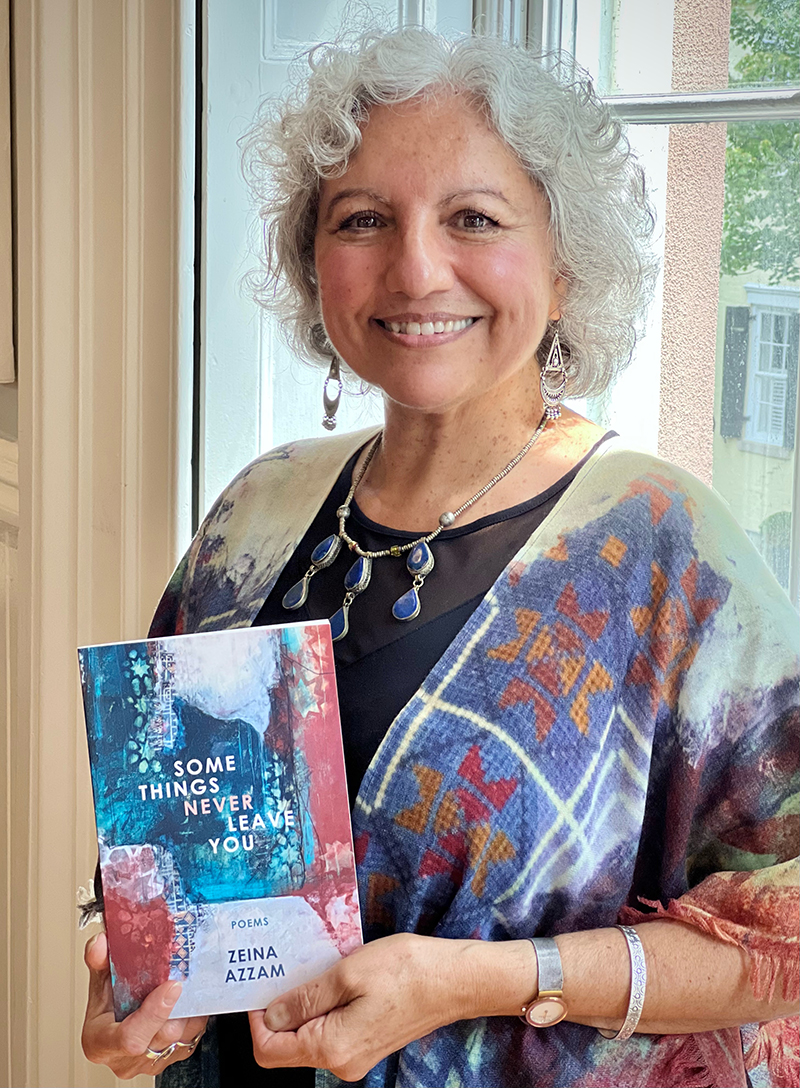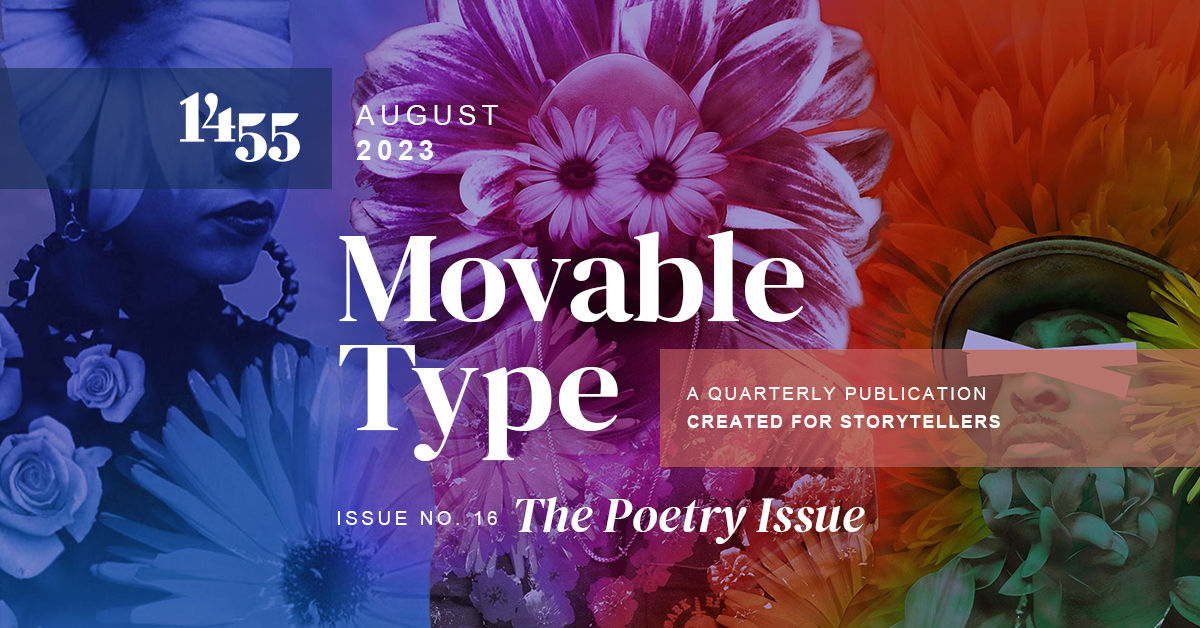Zeina Azzam
Poems
Jazz Singer
For Lena
In a tenebrous corner
of the hushed cafe
her face reflects light
from muted candles
flickering all around.
The faint brassy gleam
of the saxophone foreshadows
a subdued melody that will
pull her in, two voices
improvising and scatting
in conversation.
The bass will then rumble,
the piano keys will ramble,
the drums will play
a dependable rhythm.
The band will watch closely
when she ushers in
the pulse of the song
like the intros of Ella
and Bessie and Duke:
a-one, a-two,
a-one-two-three-four….
They will follow her hand
for clues to stop, repeat,
or continue playing
as she makes a circle in the air
with her index finger
or a raised fist —
sometimes closed like a heart,
others open then slowly folding in —
while fingers snap to etch beats
over a palette of sound.
Then, her lids down,
hand gently clasping the microphone,
a voice mellifluous and undimmed
starts to flow,
a bright light
in a dark room.
Just Like That
When our neighbor’s son was gunned down in Beirut
when streets flooded after monsoon-like rains
my parents would only say, inshallah things will get better.
At the beach when I was eight
a flurry of people rushed into the water
then returned, somber,
carrying a young man’s limp body on a raft.
Once as my mother’s nimble fingers
braided my long black locks
I watched a war unfold on TV.
Some nights I fell asleep reciting my parents’ words
inshallah things will get better
often thinking that maybe I, too,
could come face to face with a gun or a bomb from the sky
storms that could sweep away my home
or whirlpools as I swam in the sea
and just like that
my life would end
a little brown body washed ashore.
Language Lesson from the Defense Department
In our time, political speech and writing are largely the defense of the indefensible. –George Orwell, “Politics and the English Language,” 1946
1.
Weapons of mass destruction:
Microscopic warriors
packed with a punch,
small as an atom:
a large legacy.
2.
Enhanced interrogation techniques:
The Latin tortura means twisted
(because twisted minds twist bodies,
burn them at the stake, slice, pull nails).
In modern times we enhance tortura
by waterboarding, wrenching, wringing.
3.
Proxy and war together:
Two marionettes dancing
to the beat of a battle drum.
4.
Collateral damage:
Note that noncombatants
always die in war
no matter if they are wearing
a bride’s veil in Kandahar
or kicking a soccer ball
on the beach in Gaza.
5.
Hellfire Missiles:
If they sliver the sky
and silver and redden the earth
according to plan,
they would be doing
their apocalyptic job.
6.
Carpet bombing:
Like the warp and weft of Persian rugs,
fires from bombs weave their way into
the smallest spaces, bond with flesh.
These carpets snuff out oxygen
of hospitals, homes, history.
7.
Friendly fire:
Affable inferno,
bosom bullet,
perfect pyre.
8.
Ethnic cleansing:
People awash with guns and dollars
cleanse away the Others—not by water
but by hellfire missiles
or carpet bombing
(see above).
One winning strategy:
force them to flee from fear.
9.
Targeted killing:
As opposed to untargeted,
which is generally less acceptable
(though both have their time and place).
10.
Humanitarian pause in the killing:
Noise of F-16s disappears.
Pallid faces, squinting eyes greet rubble.
Rice and yogurt arrive.
Corpses cleared, time to count family members.
Basement doors creak open again
then shutter as stores re-shutter.
A few hours of paper-thin peace
to give attackers a break.
Orphaned
To my brother, Fateh
We used to be five
like lobes of a leaf,
fingers on the Hand of Fatima
hanging at my front door
Suddenly winter paused,
stopped its march toward spring,
arteries shriveled,
bones unclasped
Father’s lonely fig tree,
bequeathed back
to the earth,
gave up, too
Our eldest brother,
a mountain we’d glimpse
from far away,
vanished behind the clouds
In her final days, Mama
would close her eyes and sway
as your voice and oud
melodied old lyrics, old friends
And now, an outstretched hand—
we’re two fingers alone,
a bilingual peace sign
proud and hopeful, yet mourning
You keep strumming
as my journals fill with odes
to almond blossoms and wild thyme,
our childhood jasmine tree
Each visit, I long to touch
our past together,
a little sister in familiar arms
of remembrance

“Azzam writes with heart and with an ear keenly tuned to the rhythms of displacement and loss. Her poems braid sorrow and hope together with the silk thread of her mother’s prayer, “khayr inshallah! Goodness, God willing!” Through her childhood memories in Arab cities to the repeated farewells and departures of exile, Azzam’s poems alternately mourn and celebrate the wonders of life; a child’s fascination with language, the estrangement of a sibling, the sensual pleasures of a resplendent meal, and the promise of renewed love. These poems are “a hedge against hardship,/an incantation” and their music will stay with you.”
—Lena Khalaf Tuffaha, author of Kaan and Her Sisters and Water & Salt

Zeina Azzam is a Palestinian American poet, writer, editor, and community activist. She is the Poet Laureate of the City of Alexandria, Virginia, for 2022-2025. Her chapbook, Bayna Bayna, In-Between, was released in 2021 by The Poetry Box. Her poems appear in journals, webzines, and anthologies including Pleiades, Mizna, Gyroscope, Cutleaf Journal, National Academy of Poets Poem-a-Day, Split this Rock, Bettering American Poetry, The Southern Poetry Anthology: Virginia, Making Mirrors: Writing/Righting by and for Refugees, Making Levantine Cuisine: Modern Foodways of the Eastern Mediterranean, and Gaza Unsilenced. Her commissioned poem, “You Birth the Seeds,” was recently rendered as a four-part choral work by the renowned composer Melissa Dunphy. Zeina’s works can also be found in art gallery catalogues and on public buses in the cities of Alexandria and Arlington, Virginia.
Website: zeinaazzam.com
Twitter: @zeina3azzam


